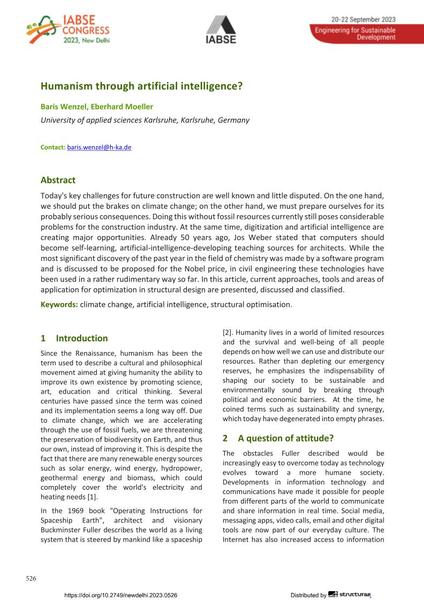Humanism through artificial intelligence?

|
|
|||||||||||
Bibliographic Details
| Author(s): |
Baris Wenzel
(University of applied sciences Karlsruhe, Karlsruhe, Germany)
Eberhard Moeller (University of applied sciences Karlsruhe, Karlsruhe, Germany) |
||||
|---|---|---|---|---|---|
| Medium: | conference paper | ||||
| Language(s): | English | ||||
| Conference: | IABSE Congress: Engineering for Sustainable Development, New Delhi, India, 20-22 September 2023 | ||||
| Published in: | IABSE Congress New Delhi 2023 | ||||
|
|||||
| Page(s): | 526-534 | ||||
| Total no. of pages: | 9 | ||||
| DOI: | 10.2749/newdelhi.2023.0526 | ||||
| Abstract: |
Today's key challenges for future construction are well known and little disputed. On the one hand, we should put the brakes on climate change; on the other hand, we must prepare ourselves for its probably serious consequences. Doing this without fossil resources currently still poses considerable problems for the construction industry. At the same time, digitization and artificial intelligence are creating major opportunities. Already 50 years ago, Jos Weber stated that computers should become self-learning, artificial-intelligence-developing teaching sources for architects. While the most significant discovery of the past year in the field of chemistry was made by a software program and is discussed to be proposed for the Nobel price, in civil engineering these technologies have been used in a rather rudimentary way so far. In this article, current approaches, tools and areas of application for optimization in structural design are presented, discussed and classified. |
||||
| Keywords: |
climate change structural optimisation artificial intelligence
|
||||
